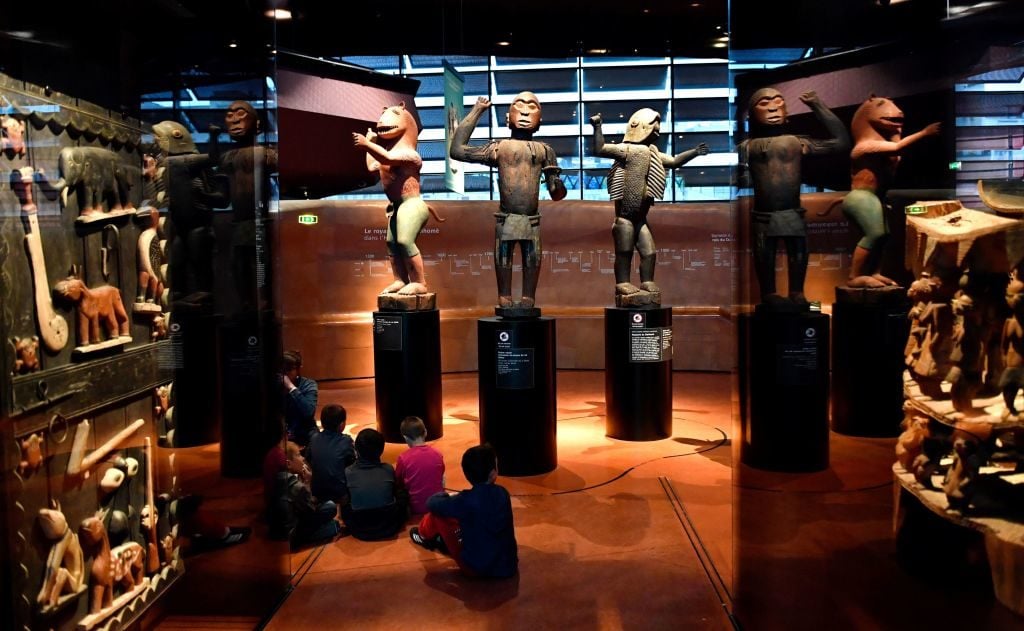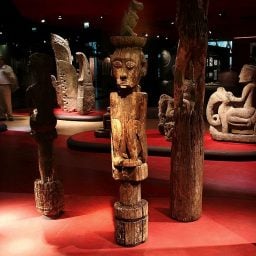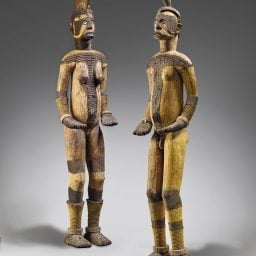The atmosphere was tense and emotional in the Paris courtroom where Congolese activist Mwazulu Diyabanza and his four associates went on trial yesterday for their high-profile action at the Musée du Quai Branly earlier this summer. Prosecutors argue it was a foiled heist; the defendants claim it was a protest against colonialism and a powerful act that symbolizes the importance of repatriation.
On June 12, the group removed an African funerary object from its display, declaring it stolen and pledging to return it to African people. They were then stopped by museum guards and arrested. A video of the incident was widely shared on social media.
Now, they are facing trial for theft. The closely watched case, which held its first hearing on September 30 in Paris, is seen by both restitution proponents and critics as a tipping point in the simmering debate over the troves of colonial-era objects held in museums across Europe and the West.
If convicted, the defendants could face up to 10 years in prison and a maximum fine of €150,000. But on Wednesday, the Public Prosecutor’s Office announced it would seek just €1,000 from Diyabanza and €500 each from the four other individuals involved in the action.
“Overall, the trial went relatively well,” Diyabanza tells Artnet News. He contends the lower fine is “a symbolic” sentence “in order not to lose face.”
The Musée du Quai Branly declined to comment. Prosecutors did not immediately respond to a request for comment. A lawyer for the Quai Branly, Yvon Goutal, said in court that the protesters’ action was unnecessary because there are already negotiations underway between France and African governments regarding restitution. The French state “is very committed to this, and serious” about following through, he said, according to the AP.
In a video posted to Facebook after the trial, the 41-year-old Congolese activist Diyabanza seemed relaxed and unintimidated by the proceedings. He donned a white shirt with the names of two African ethnic groups down the side of each arm sleeve, the Soninke and the Yoruba.
Hakim Chergui, a lawyer for the defendants, tells Artnet News he used feminist group FEMEN as a precedent for his clients’ acquittal. A member of that group was tried and acquitted in 2014 in Paris on a charge of sexual exhibition after she bared her chest and attacked a statue of Russian President Vladimir Putin at a wax museum. The event was deemed a political act. Diyabanza’s lawyers maintain that their clients operated in a similar way.
Chergui says the hearing was “emotional” and “tense” given “the passion that animates many activists from the diaspora.” One woman was removed from the courtroom for interrupting the proceedings, he notes.
Lawyer Yvon Goutal, who is representing the museum, tells Artnet News that if “it is conceivable (and judged in France in the case of a FEMEN) that a crime of bodily expression, such as sexual exhibition, can be justified by freedom of expression, it is neither possible nor desirable that freedom of expression can legitimize crimes of the type of theft,” he says, adding “What does it mean, concretely, to ‘bring the works back to the country’ or ‘return to Africans, not to African states,’ as was argued at the hearing?”
Diyabanza and his four associates paid entry to the Musée du Quai Branly in Paris before removing a funerary pole from modern-day Chad from a display, announcing over Facebook Live that they would return it to Africa. “The names at the entrance of this museum are the names of colonizers who pillaged the art that is now here,” Diyabanza said in the video. He has taken similar actions in Marseille and in the Netherlands since then.
Chergui claims the case “is not really about the trial of the young activists,” but rather about “the trial of the ‘colonial continuum,'” a term that references “the permanence and maintenance in France of a colonial mentality, which refuses to face its past.”
A verdict is expected on October 14.
[This story was updated on October 6 to include comments from Yvon Goutal.]









